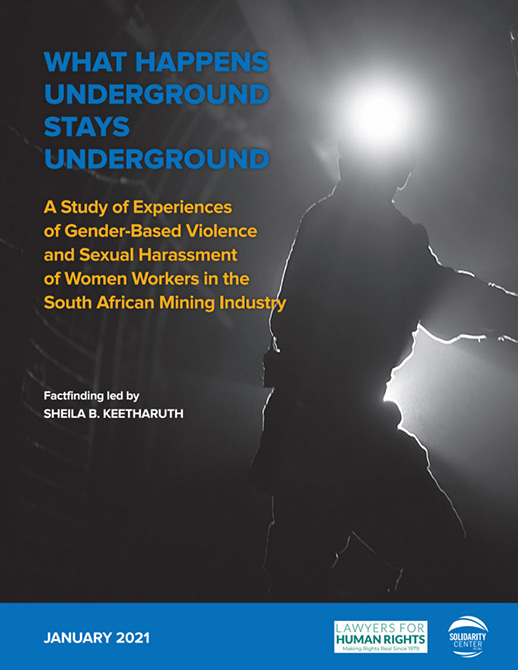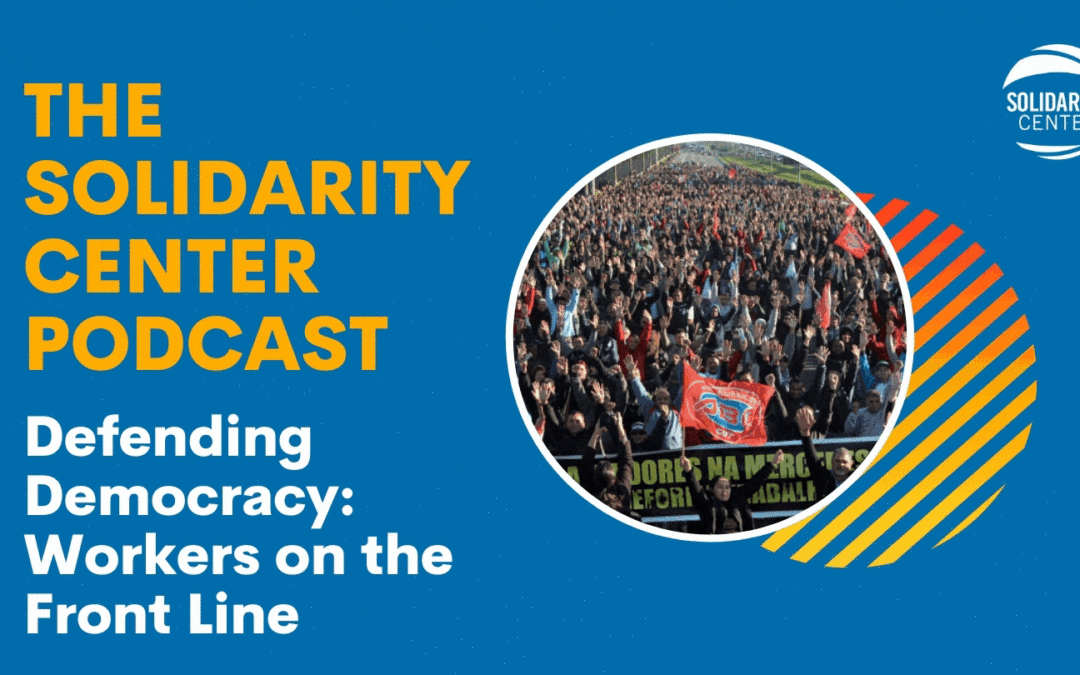Worker Rights Experts Contribute to Ukraine Human Rights Strategy
Legal experts supported by Solidarity Center partner Labor Initiatives (LI), an organization representing and advancing worker rights in Ukraine, contributed recommendations that were incorporated into the country’s latest National Human Rights Strategy. The 2021–2023 strategy—a legally binding document to be implemented by state authorities in accordance with United Nations International Standards and Principals and Ukraine’s Association Agreement with the European Union—was signed into force by President Volodymyr Zelensky earlier this year.
Up to 100 action points are listed in the new strategy, including several advanced by LI lawyers Inna Kudinska, George Sandul, Katia Shvets and Nadia Yolkina in sections on freedom of association, worker rights, social protections, business and human rights, and anti-discrimination.
“The increasing significance of the LI team’s expertise is reinforcing its ability to make workers’ voices heard,” says Solidarity Center Ukraine Country Program Director Stanislaw Cieniuch.
Action points successfully advanced by LI to promote gender equality include: 1) Ratification of Convention 190, a new global International Labor Organization (ILO) treaty to prevent and address violence and harassment in the world of work that includes gender-based violence and harassment; 2) Amendment of the national labor code on equal pay and reduction of the gender pay gap; and 3) Development of national policies to shift the burden of proof in discrimination cases—including gender-based cases—from the employee to the employer.
LI’s lawyers also advanced action points for amending the country’s law on collective labor disputes, including ways to improve dispute resolution procedures and remove bureaucratic barriers preventing workers from exercising their right to strike.
“Labor is the defining part of life for every person,” reports LI. “[S]trong labor rights protections and rule of law are core safeguards to avoid catastrophic consequences for the people of Ukraine.”
Ukraine’s National Human Rights Strategy—first developed in cooperation with international organizations and civil society in 2015—is intended to develop a document that outlines citizens’ legal protections and to unite society around a common understanding of the value of human rights and freedoms to be protected equally and without discrimination.

SE Europe: Unions Unblocking Barriers for LGBTQ Workers
LGBTQ workers in Southeastern Europe face daunting barriers to attaining equality and safety on the job, among them exclusion, discrimination in obtaining employment, harassment and violence on the job, and poverty.
In the region, two-thirds of workers who identify as LGBTQ hide their identity due to fear of losing their job, fear of alienation and discrimination from other colleagues, fear of violence and fear of exploitation, according to research by LGBTQ Equal Rights Association for Western Balkans and Turkey (ERA), an umbrella organization for more than 60 LGBTQ groups in the region. ERA also reports that 16 percent of workers surveyed have experienced unfair treatment with respect to employment conditions, and 41 percent of workers have witnessed negative conduct toward their colleagues who identify as LGBTQ.
“This is where unions come in. These are workers who are being harassed simply for showing up and doing their job. That is definitely a trade union issue,” says Steven McCloud, country program director for Albania, Bosnia and Herzegovina, Montenegro and Serbia.
This year, the Solidarity Center launched a program with Southeast Europe regional trade union network Solidarnost, participating unions in Albania, Bosnia and Herzegovina, Montenegro and Serbia, and Pride at Work, which represents LGBTQ union members in the United States, to take on LGBTQ worker issues and build solidarity by addressing LGBTQ discrimination and harassment at work as part of larger efforts tied to improving occupational safety and health and eradicating gender-based violence and harassment on the job. The program focuses on the intersection of LGBTQ rights with workers’ rights to safe and healthy workplaces free from violence and harassment.
Countries in Southeastern Europe have some laws that protect LGBTQ people from basic discrimination. However, the struggle often lies in creating a safe space where LGBTQ workers who experience discrimination can come forward, exercise their rights and be supported, McCloud says.
“This can be done through promoting practices that strengthen their visibility, representation and capacity in trade unions in those countries,” says McCloud. “LGBTQ rights are worker rights, and unions need to ensure that LGBTQ workers are meaningfully included and represented.”
[Borgen Magazine] Remember Who Made Them: Celebrating Garment Workers
“In its six-part podcast series, Remember Who Made Them delves into conversations with fashion advocates, philanthropists, social justice workers and sustainability experts. Some of the organizations featured in the series include Remake World, the #PayUp campaign, the Solidarity Center and Business and Human Rights Resource Center.”

What Happens Underground Stays Underground
Women working in South Africa’s mining sector report being subject to sexual and gender-based violence and harassment, inside mines and within the mining communities where they live and efforts to redress such abuse must address the nature of the workplace and political, social and economic factors.

Podcast: Defending Democracy—Workers on the Front Lines
Democracy is under siege around the world with the subversion of democratic processes and outright coups—and attacks worker rights are a big part of authoritarian efforts to cut off civil liberties.
On this week’s Solidarity Center Podcast, two worker advocates from countries where democracy is under threat—Belarus and Brazil—discuss how workers are pushing back against repression and are building a better future for their countries, one that recognizes worker rights are a foundation of true democracy.
Maximilano Garcez, president of the Brazilian Association of Union Lawyers, represented families of the 272 people who died in a preventable mining disaster in 2019. The Brumadinho mining waste dam, held by walls of sand, collapsed during rainy season cutting a path of destruction from the mine and for miles into the surrounding community. It is among nearly 100 mining dams in the country built the same way.
The mining disaster was “industrial homicide”—the result of corporations “incentivized to greed” in a system where “killing people has been worthwhile,” says Garcez.
Workers Rise Up in Belarus Against Repressive Regime
Also on the show, Sergey Antusevich, vice president of the Belarusian Congress of Democratic Trade Unions, describes the recent uprising against the country’s repressive regime in which workers, led in many cases by women, have taken a key role.
“Many factories began to express a position actively, protest against violence and fraud, and started for the first time in Belarus history to set up strike committees” despite a strike ban, he says.
“At the same time, the protesters made demands: resignation of Lukashenko and his clique and an end to violence and repression and holding fair elections. At the same time, workers and employers began to quit the state trade unions and tried to create independent trade unions.”
The Solidarity Center Podcast, “Billions of Us, One Just Future,” highlights conversations with workers (and other smart people) worldwide shaping the workplace for the better.
Join us for a new episode each Wednesday at iTunes, Spotify, Amazon, Stitcher or wherever you listen to your podcasts.
Solidarity Center Podcast Schedule
- March 24: Preeda, a migrant worker rights activist in Thailand working with unions to help migrant workers meet the challenges of COVID-19.
- April 7: Francia Blanco, a domestic worker and trans rights activist reaching marginalized workers through her all-trans domestic workers union.
- April 14: Adriana Paz, an advocate with the International Domestic Workers Federation who understands firsthand the power of unions in ensuring domestic workers have safe, decent jobs.
- April 21: International Trade Union Confederation President Ayuba Wabba, who explores the Nigerian labor movement’s response to the COVID crisis on workers and discusses the global labor movement’s plans to build back better for workers around the world.
This podcast was made possible by the generous support of the American people through the U.S. Agency for International Development (USAID) under Cooperative Agreement No.AID-OAA-L-16-00001 and the opinions expressed herein are those of the participant(s) and do not necessarily reflect the views of USAID/USG.
